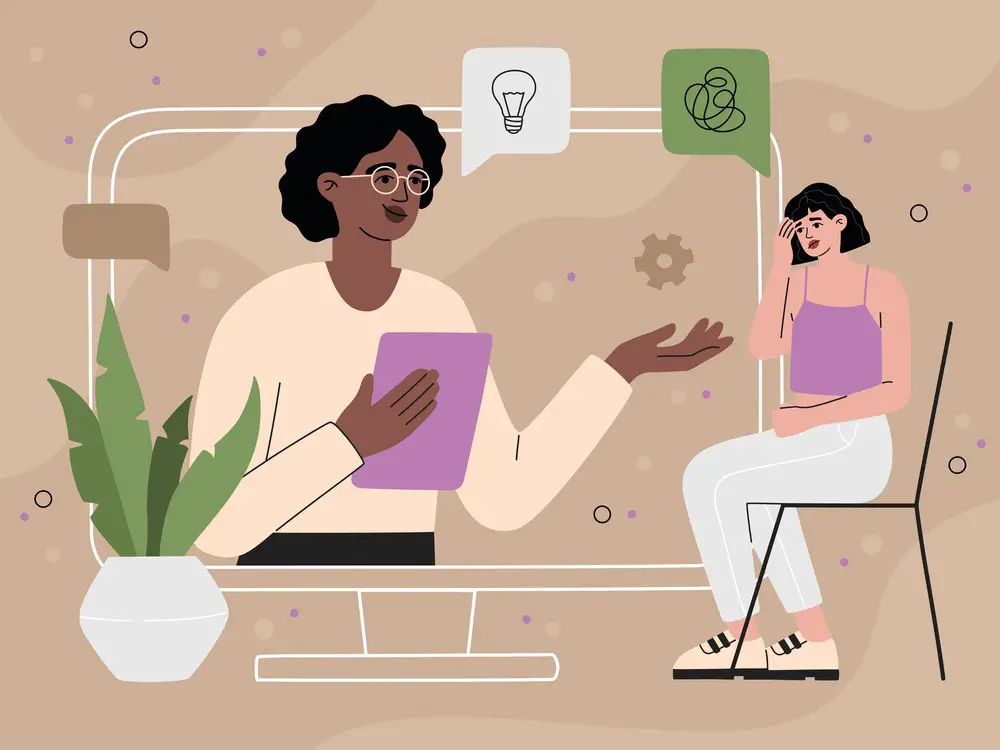As a BetterHelp affiliate, we receive compensation from BetterHelp if you purchase products or services through the links provided
Therapy can be a powerful tool for managing stress and anxiety. However, it is essential to know how to get the most out of therapy to maximize its potential benefits. Whether you’re seeking help from an online or offline therapist, there are steps you can take before, during, and after your sessions to help ensure success. In this blog post, we’ll discuss how to get the most out of therapy so that it’s as effective as possible for tackling issues like insomnia and anxiety. We’ll cover topics such as the types of therapy available, the benefits of attending regular sessions, preparation tips for your first session, what happens during each session, and finding support outside therapy when needed. Then, let’s explore how getting the most out of therapy can lead us toward improved mental health!
Table of Contents:
Types of Therapy
Online Therapy: Online therapy is a type of counseling that takes place over the internet, usually through video chat or messaging. It can be a convenient and cost-effective way to access mental health services from the comfort of your own home. Some advantages of online therapy include increased flexibility in scheduling appointments, anonymity for those who may feel uncomfortable discussing their issues in person, and lower costs than traditional face-to-face therapy. However, it’s important to note that online therapy isn’t suitable for everyone; some people may find it challenging to build trust with their therapist without meeting them in person.
In-Person Therapy: In-person therapy involves meeting with a licensed mental health professional at an office or clinic setting. This type of counseling allows you to have direct contact with your therapist, which can help build trust and rapport more quickly than online sessions. Additionally, this type of counseling provides opportunities for hands-on activities such as art or movement therapies unavailable through virtual sessions. However, the downside is that it can be more expensive and time-consuming due to travel time and other logistical considerations like childcare if needed during the session.
Different types of therapy offer different approaches to addressing mental health issues, so it’s essential to find the right style for you. Next, let’s look at some of the benefits that therapy can provide.
Also Read:
The Pros and Cons of Online Therapy Compared to In-Person Sessions
5 Incredible Things That Will Happen to Your Brain When You Start Therapy
Benefits of Therapy
Therapy is a great way to improve mental health, increase self-awareness, and reduce stress and anxiety levels. It can be done in person with a therapist or online from the comfort of your home.
Improved Mental Health
Therapy can help you gain insight into yourself and how you interact with others. This understanding can lead to improved relationships, better communication skills, increased self-esteem, and a positive outlook on life. Through therapy, you will learn coping strategies for dealing with difficult emotions, such as anger or sadness, that may have been previously unmanageable. Additionally, it can help you identify unhealthy patterns of behavior that are holding you back from reaching your goals.
Increased Self-Awareness
Through therapy sessions, individuals often become more aware of their thoughts and feelings, leading to greater emotional intelligence. With this newfound awareness comes an ability to recognize triggers for certain behaviors and take steps toward changing them if necessary. In addition, as people become more mindful of their actions, they also tend to make healthier choices when it comes to dieting or exercising, which helps create a sense of balance in one’s life overall.
Reduced Stress and Anxiety Levels
Therapy can be a powerful tool for improving mental health, increasing self-awareness, and reducing stress and anxiety. You will get the most out of therapy by preparing for your first session with research and setting goals.
Preparing for Your First Session
Preparing for your first session with a therapist can be intimidating, but it doesn’t have to be. Taking the time to research and set goals ahead of time can help make the process smoother and more successful.
Research Different Therapists and Types of Therapy: Before committing to any one therapist or type of therapy, it is essential to do some research. Look into different types of therapy, such as online, in-person, or group sessions, to know what options are available. Research therapists who specialize in treating anxiety or insomnia if that is your primary concern. Make sure their approach aligns with your needs and values before scheduling an appointment.
Make a List of Goals for Your Sessions: Once you have chosen a therapist, take some time to think about what you want out of the sessions. What areas would you like them to focus on? Are there any specific skills or techniques that could help improve your mental health? Writing down these goals will give you and your therapist something concrete to work toward during each session.
It can also be helpful to consider what topics might come up during the session beforehand so that when it comes time for the appointment, you feel prepared and ready to talk openly about whatever arises without feeling overwhelmed by unexpected questions or topics being brought up. Consider how much detail you want to share regarding specific issues and how comfortable discussing certain topics makes you feel overall – this will help guide conversations between yourself and your therapist throughout each session moving forward.
Preparing for your first session is essential in getting the most out of therapy. By researching different therapists and types of therapy, making a list of goals for your sessions, and considering what you want to talk about in your session, you can ensure that you get the most out of each appointment. Now let’s look at some tips for during the session.
During the Session: Tips for Getting the Most Out of It
It is crucial to get the most out of your therapy sessions to make progress and achieve your goals. Here are some tips for getting the most out of each session:
Be Open and Honest with Your Therapist: It can be challenging to open up about personal issues, but it is essential to progress in therapy. Being honest and vulnerable will help you build a trusting relationship with your therapist, which is crucial for successful treatment. Ask questions if there’s something you don’t understand or agree with – this will help ensure that you clearly understand what’s being discussed during the session.
Ask Questions and Clarify Anything You Don’t Understand or Agree With: Asking questions shows that you are engaged in the process and want to gain clarity on any topics that may be confusing or unclear. This also helps create an environment where it’s safe to express doubts or disagreements without feeling judged by your therapist.
Take Notes During the Session to Help You Remember What Was Discussed: Taking notes during each session can help jog your memory when reflecting on what was discussed later. Writing down thoughts, feelings, insights, etc., can also provide helpful context and highlight areas where further exploration might be beneficial during future sessions. Additionally, having written records of each session allows you to track your progress over time more quickly than relying solely on memory alone.
Overall, taking these steps will allow you to maximize the benefit from each therapy session, enabling you to reach your goals more quickly and effectively.
Taking the time to reflect and follow up on what was discussed in your therapy session can help you get the most out of it. Next, we will look at how to do this effectively.
After the Session: Reflection and Follow Up
Reflect on What Was Discussed in the Session: After each session, it is crucial to take some time to reflect on what was discussed. Think about how you felt during the session and any insights or new perspectives that may have come up. It can be helpful to write down your thoughts and feelings in a journal so that you can look back at them later. This will help you track your progress over time and identify patterns or areas of growth.
Follow Up With Any Assignments Given by Your Therapist: Many therapists assign homework between sessions (particularly with CBT therapy), such as reading materials, writing exercises, or activities designed to practice specific skills. Make sure to follow through with these assignments, as they are an essential part of the therapeutic process and help you get the most out of therapy.
Setting goals for yourself between sessions is a great way to stay motivated and continue making progress toward achieving your desired outcomes from therapy. Consider setting short-term goals (for example, practicing relaxation techniques every day) and long-term goals (such as reducing stress levels overall). Writing down these goals can help keep you accountable and provide motivation when times get tough.
After reflecting on what was discussed in the session and following up with any assignments your therapist gave, it is also essential to seek out support outside of therapy.
Finding Support Outside of Therapy
Finding support outside traditional therapy settings can be a great way to manage stress and anxiety. However, it’s important to remember that you don’t have to go through it alone, and many resources are available for those who need help.
Seek Out Supportive Friends and Family Members: Having supportive friends is essential when dealing with mental health issues such as anxiety or insomnia. They can provide emotional support, understanding, and advice in difficult times. Talking about your feelings with someone close to you can also help reduce the sense of isolation that often comes with these conditions.
Join an Online or In-Person Support Group: Joining a support group is another excellent way to find comfort in knowing that you aren’t alone in your struggles. These groups offer a safe space where people can share their experiences without fear of judgment or criticism from others. Whether online or in person, these groups are often led by experienced facilitators who understand the challenges those living with mental health issues like anxiety or insomnia face.
Participate in Relaxation Activities: Relaxation Activities like yoga, meditation, journaling, deep breathing exercises, etc., can help manage stress levels associated with anxiety and insomnia. In addition, research has shown that regular practice of mindfulness techniques helps improve focus while reducing rumination on negative thoughts, which may lead to further distress if left unchecked over time.
When to Seek Professional Help: If symptoms become severe enough, it might be necessary to seek professional help from a qualified therapist specializing in treating mental health disorders such as depression, anxiety, or insomnia. It is essential for diagnosis and treatment planning purposes to implement appropriate interventions quickly before the condition worsens. For example, if suicidal thoughts occur, seeking immediate medical attention should prioritize over all other considerations. Likewise, if substance abuse becomes involved, specialized treatment centers should be consulted immediately since this could potentially lead to dangerous paths if left untreated.
FAQs
What makes therapy most effective?
Therapy is most effective when clients feel comfortable and safe to express their thoughts, feelings, and experiences. This can be achieved through a trusting relationship between the therapist and client that allows for open communication. Additionally, an individualized approach tailored to each person’s needs helps ensure that therapy successfully addresses their specific concerns. Finally, regular session attendance and commitment from both parties are essential components for achieving positive outcomes from treatment.
How do I go deeper in therapy?
Therapy is a great way to explore your feelings and learn new ways of coping with anxiety or insomnia. To go deeper in therapy, it’s essential to be open and honest with your therapist about your feelings. Talk openly about any fears or worries that may be holding you back from making progress. Your therapist can help you identify the root causes of your issues and develop strategies for overcoming them. It’s also helpful to practice relaxation techniques such as deep breathing, mindfulness meditation, or progressive muscle relaxation regularly between sessions. With dedication and commitment, therapy can help you gain insight into yourself and make lasting changes in managing life stressors.
What should you not do in a therapy session?
It is essential to be respectful and honest in a therapy session. Do not use the session to vent or blame others for your issues. Avoid bringing up topics unrelated to the issue you are seeking help with, as this can distract from the progress being made. Additionally, do not try to diagnose yourself or offer advice; instead, focus on understanding your feelings and how they affect your life. Lastly, do not expect immediate results; it takes time and effort to make meaningful changes in one’s life.
What should you not say in therapy?
It is essential to be respectful and honest in therapy, but it is also important to remember that certain words or phrases can be hurtful. For example, avoid saying anything that could be interpreted as blaming yourself or others for your issues, such as “I’m so stupid” or “you always make me feel this way.” Additionally, avoid making any comments about the therapist – these should remain focused on you and your progress. Finally, do not use any language that is overly negative or aggressive; instead, focus on expressing how you are feeling constructively.
Conclusion
Therapy can be an excellent tool for managing stress, anxiety, and insomnia. Finding the type of therapy that works best for you and your needs is essential. Taking the time to prepare for your first session, understanding what to expect during the session, and reflecting on it afterward will help you get the most out of therapy. Additionally, having support outside of therapy can also be beneficial in helping you achieve success with your goals. With all these tips in mind, getting the most out of therapy should become easier as you gain more experience.
Take the first step towards a better tomorrow by learning how to get the most out of therapy. From understanding different stress relief methods to finding and choosing an experienced therapist that best fits your needs – Rest Equation is here for you! With our easy-to-follow advice and resources, we will help guide you through this journey so that you can find peace in life again. So don’t wait any longer; start today on your path toward emotional well-being.
- 7 Ideas to Help You Relax and Unwind on a Family Vacation - April 27, 2025
- How Having Cybersecurity Protection Helps You Relax - April 25, 2025
- 8 Reasons Why Spending Time Outside Calms You Down - April 25, 2025
This site contains affiliate links to products. We will receive a commission for purchases made through these links.






